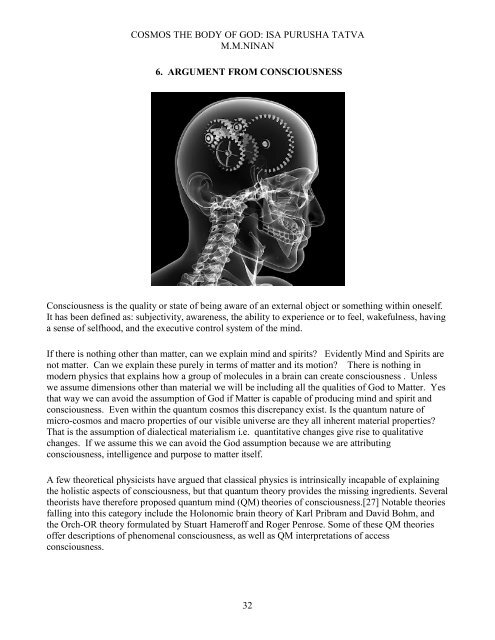You also want an ePaper? Increase the reach of your titles
YUMPU automatically turns print PDFs into web optimized ePapers that Google loves.
COSMOS THE BODY OF GOD: ISA PURUSHA TATVA<br />
M.M.NINAN<br />
6. ARGUMENT FROM CONSCIOUSNESS<br />
Consciousness is the quality or state <strong>of</strong> being aware <strong>of</strong> an external object or something within oneself.<br />
It has been defined as: subjectivity, awareness, the ability to experience or to feel, wakefulness, having<br />
a sense <strong>of</strong> selfhood, and the executive control system <strong>of</strong> the mind.<br />
If there is nothing other than matter, can we explain mind and spirits? Evidently Mind and Spirits are<br />
not matter. Can we explain these purely in terms <strong>of</strong> matter and its motion? There is nothing in<br />
modern physics that explains how a group <strong>of</strong> molecules in a brain can create consciousness . Unless<br />
we assume dimensions other than material we will be including all the qualities <strong>of</strong> <strong>God</strong> to Matter. Yes<br />
that way we can avoid the assumption <strong>of</strong> <strong>God</strong> if Matter is capable <strong>of</strong> producing mind and spirit and<br />
consciousness. Even within the quantum cosmos this discrepancy exist. Is the quantum nature <strong>of</strong><br />
micro-cosmos and macro properties <strong>of</strong> our visible universe are they all inherent material properties?<br />
That is the assumption <strong>of</strong> dialectical materialism i.e. quantitative changes give rise to qualitative<br />
changes. If we assume this we can avoid the <strong>God</strong> assumption because we are attributing<br />
consciousness, intelligence and purpose to matter itself.<br />
A few theoretical physicists have argued that classical physics is intrinsically incapable <strong>of</strong> explaining<br />
the holistic aspects <strong>of</strong> consciousness, but that quantum theory provides the missing ingredients. Several<br />
theorists have therefore proposed quantum mind (QM) theories <strong>of</strong> consciousness.[27] Notable theories<br />
falling into this category include the Holonomic brain theory <strong>of</strong> Karl Pribram and David Bohm, and<br />
the Orch-OR theory formulated by Stuart Hamer<strong>of</strong>f and Roger Penrose. Some <strong>of</strong> these QM theories<br />
<strong>of</strong>fer descriptions <strong>of</strong> phenomenal consciousness, as well as QM interpretations <strong>of</strong> access<br />
consciousness.<br />
32


















